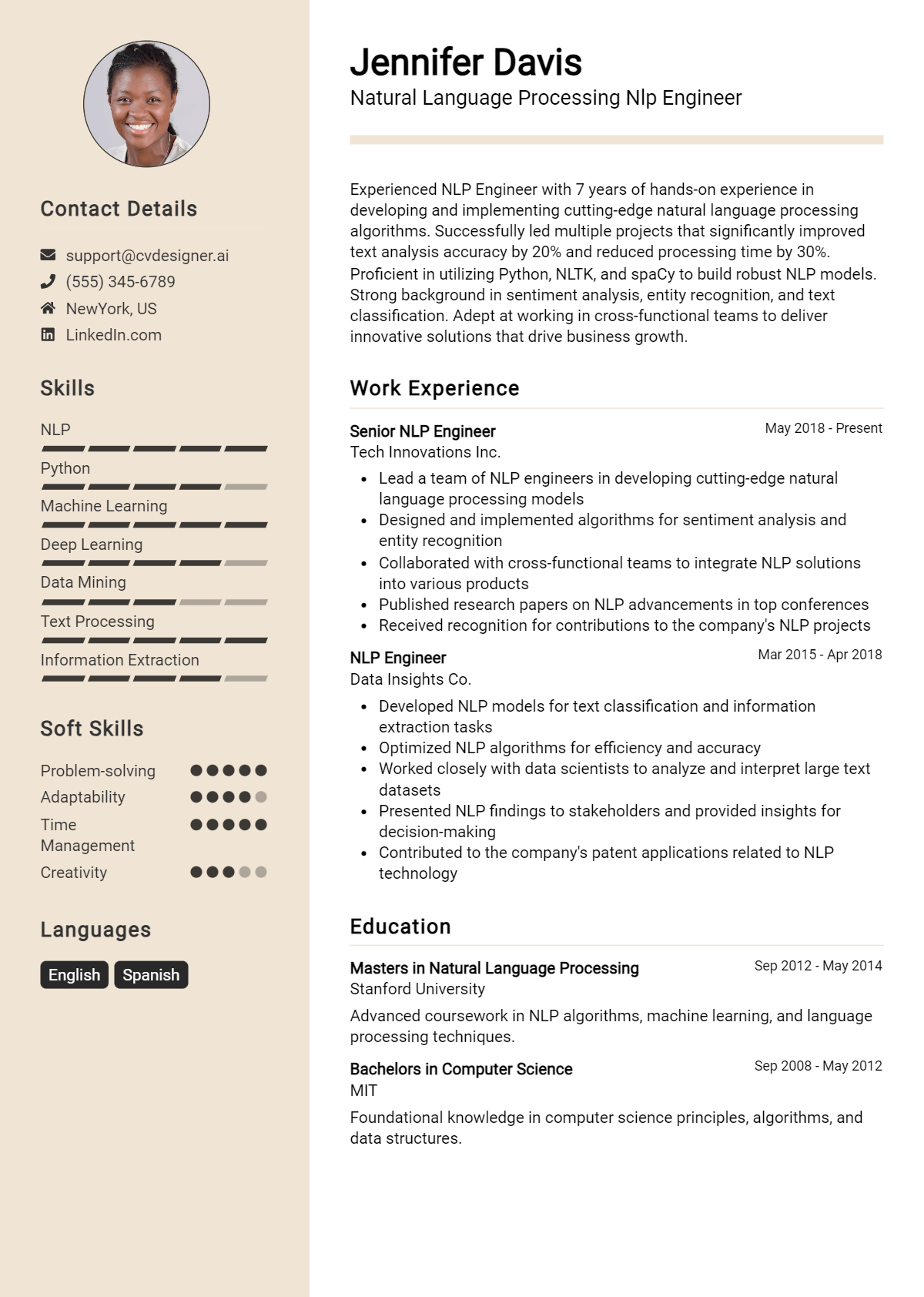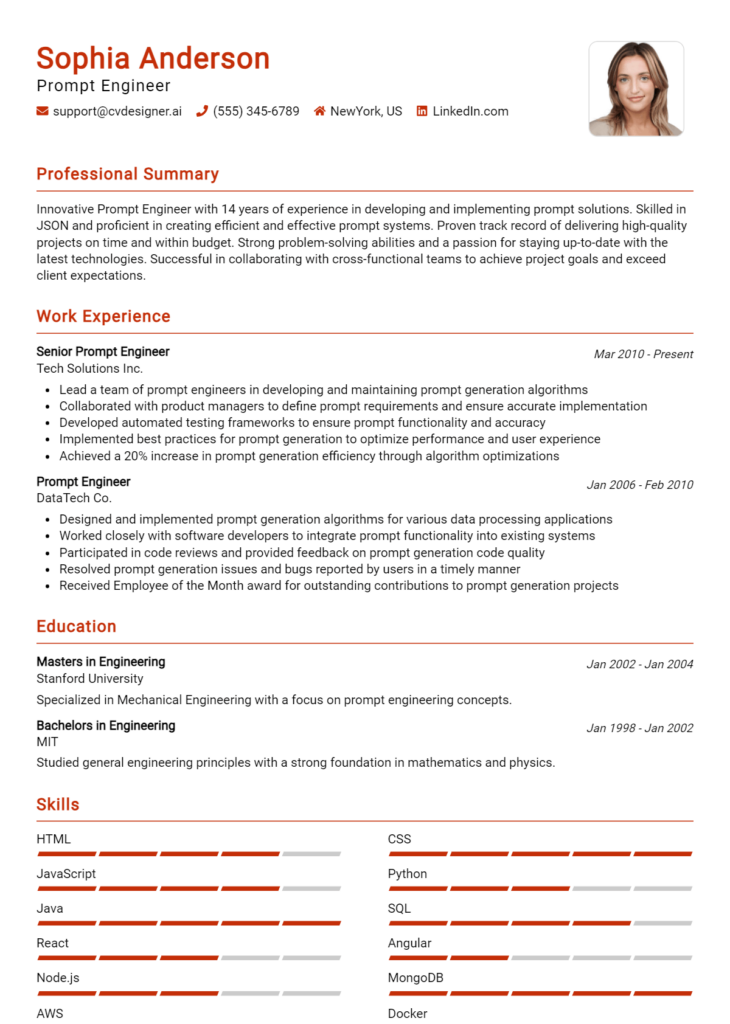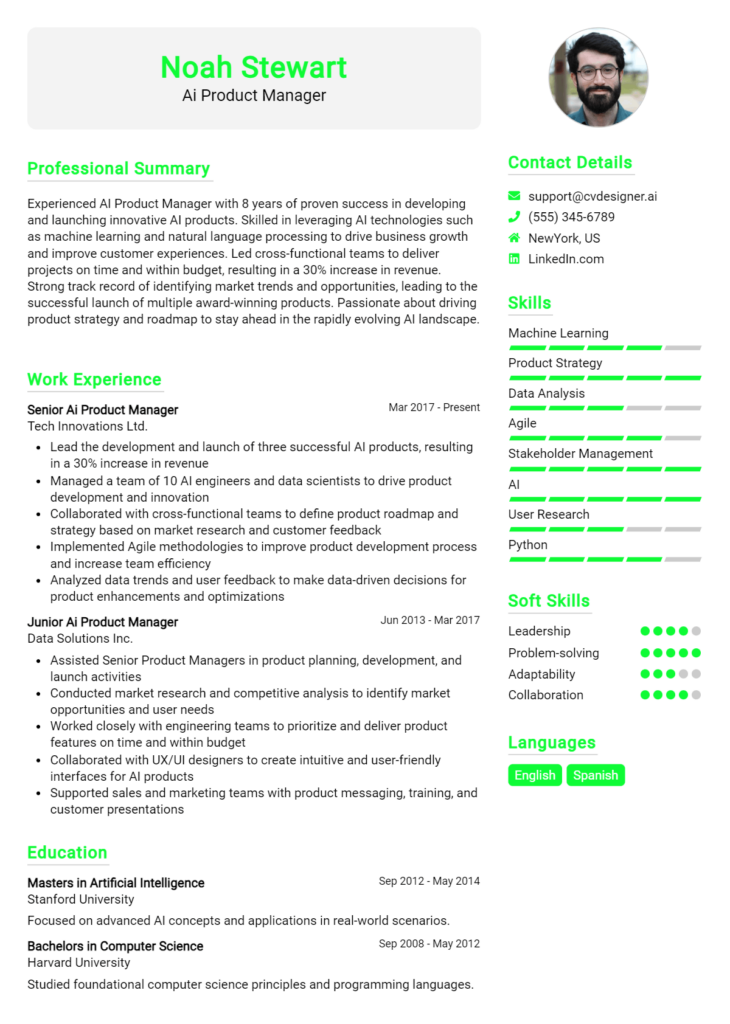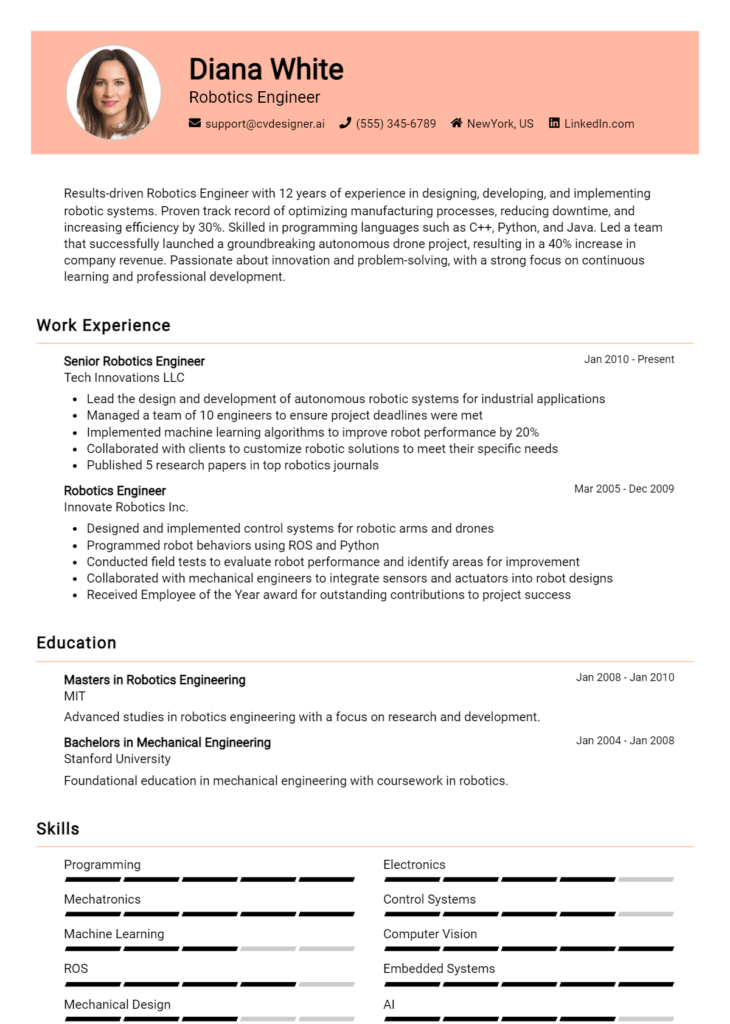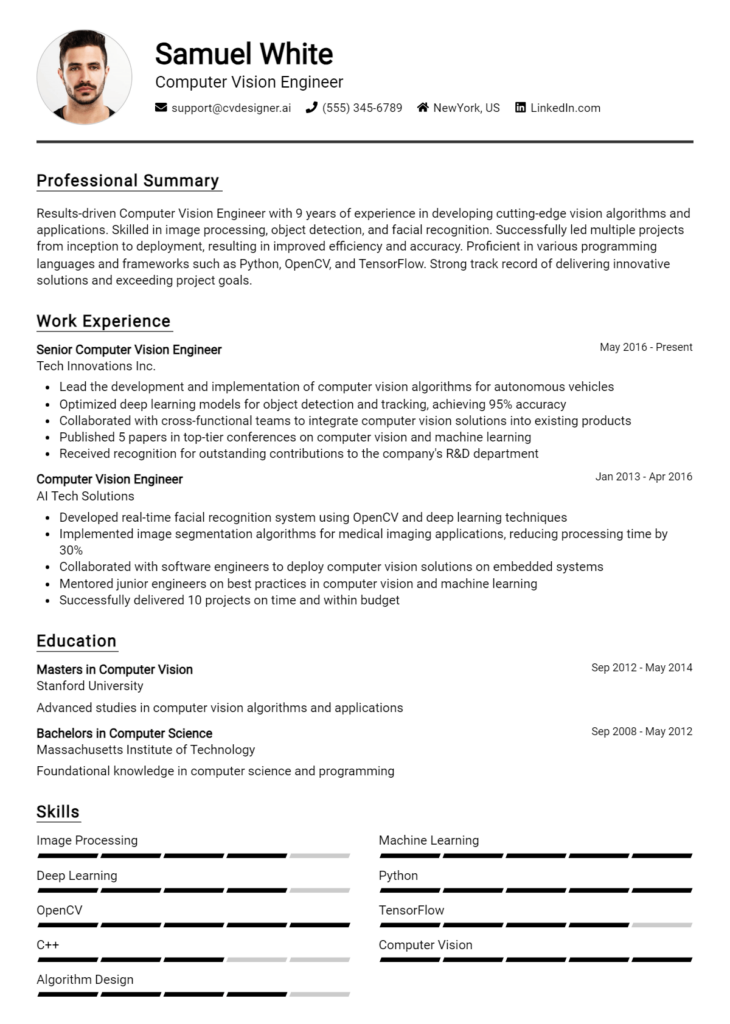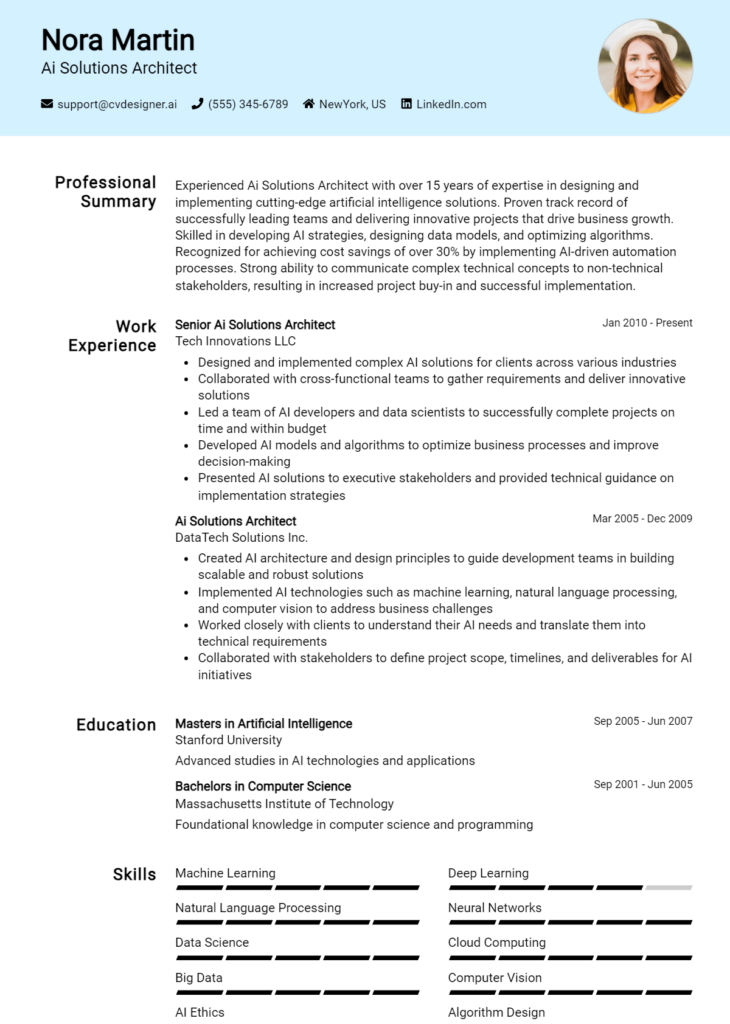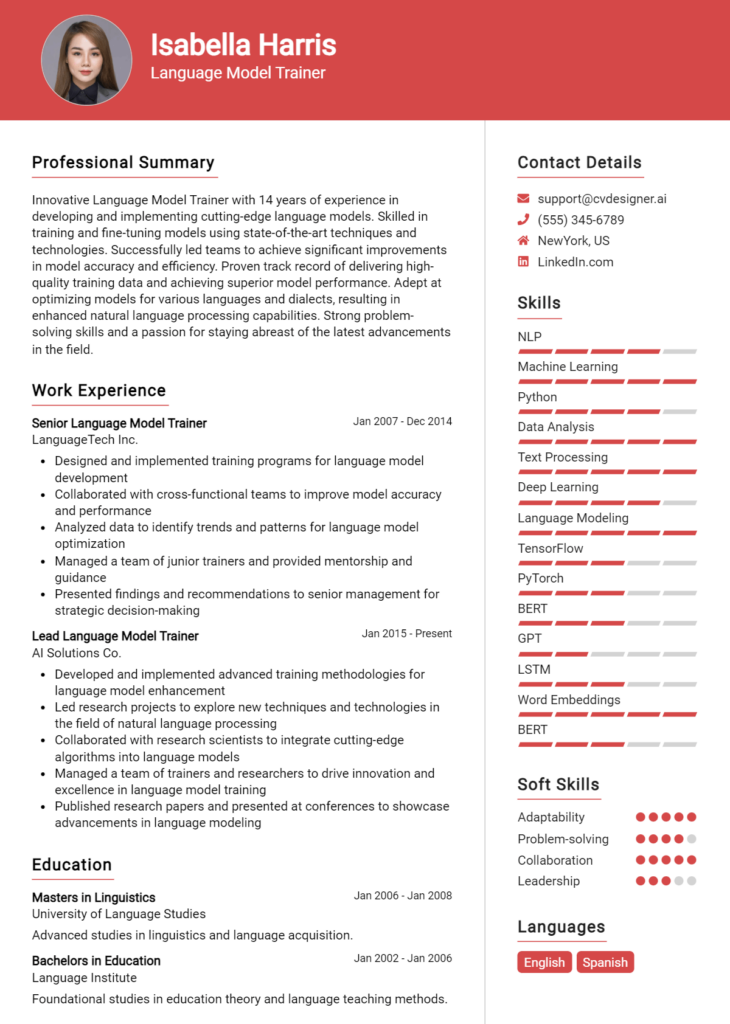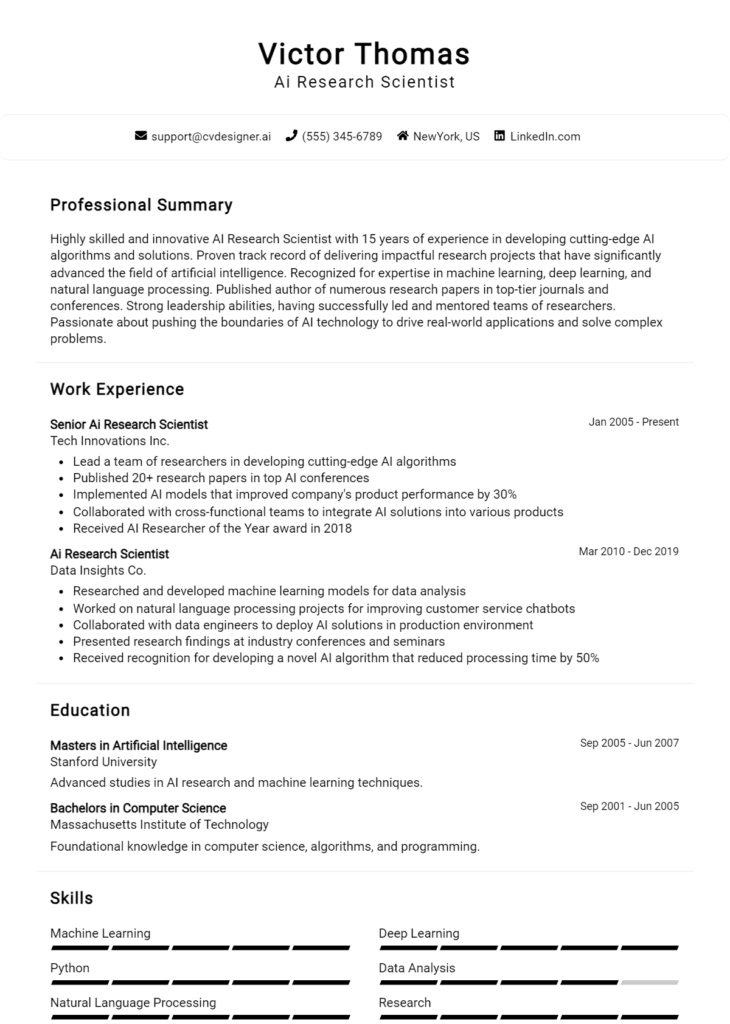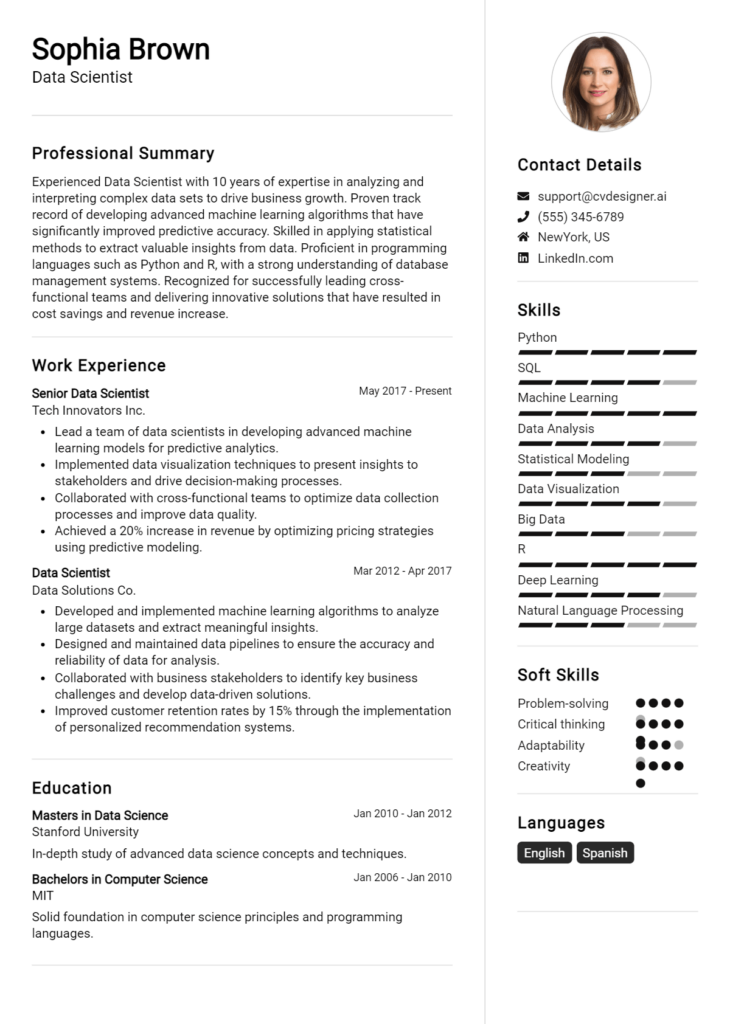Most Popular Natural Language Processing Nlp Engineer Resume Examples
Explore additional Natural Language Processing Nlp Engineer resume samples and guides and see what works for your level of experience or role.
As the digital landscape continues to evolve, the demand for skilled Natural Language Processing (NLP) Engineers has surged, making this role more critical than ever in bridging the gap between human language and machine understanding. Whether you're developing chatbots, enhancing search engines, or working on voice recognition systems, a well-crafted resume can be the key to landing your dream job in this competitive field. A standout resume not only highlights your technical prowess but also showcases your ability to solve complex linguistic problems, making it essential for standing out in a pool of applicants.
In this comprehensive guide, we’ll delve into the essential components of an NLP Engineer's resume. We'll cover key responsibilities and skills that employers are looking for, helping you tailor your resume to showcase your strengths. You'll discover the best formats to use, common pitfalls to avoid when crafting your application, and resume examples tailored for various experience levels—from entry-level to seasoned professionals. Plus, we’ll provide valuable tips on effective resume writing, as well as guidance on selecting the right resume templates to elevate your presentation. Prepare to take your resume to the next level and make a lasting impression in the world of NLP engineering!
Key Responsibilities and Skills for a Natural Language Processing (NLP) Engineer
As a Natural Language Processing (NLP) Engineer, the key responsibilities encompass a diverse range of tasks focused on enabling machines to understand and interpret human language. You will be expected to design, develop, and implement NLP algorithms and models to facilitate tasks such as language translation, sentiment analysis, and information extraction. Collaborating with data scientists and software engineers is also a crucial part of the role, as you will work on integrating NLP capabilities into applications and systems.
To excel in this position, the following essential skills are required:
- Proficiency in programming languages such as Python, Java, or R
- Strong understanding of NLP libraries and frameworks (e.g., NLTK, SpaCy, TensorFlow, PyTorch)
- Experience with machine learning and deep learning techniques
- Familiarity with linguistic concepts and language models (e.g., BERT, GPT)
- Knowledge of data preprocessing, feature extraction, and data augmentation techniques
- Ability to work with large datasets and perform data analysis
- Problem-solving skills and the ability to think critically about language processing challenges
- Excellent communication skills for presenting findings and collaborating with teams
Effectively highlighting these skills in the resume skills section is vital, as it allows potential employers to quickly assess your qualifications and fit for the role. Additionally, tailoring these responsibilities and skills to align with the specific job description can significantly enhance your chances of standing out in a competitive job market. When crafting your CV, consider how these skills and responsibilities can be articulated to reflect your experiences and achievements, ultimately showcasing your expertise as a proficient NLP Engineer.
Best Resume Format and Structure for a Natural Language Processing (NLP) Engineer
When crafting a resume for a Natural Language Processing (NLP) Engineer position, it's vital to choose a format that highlights your technical skills, relevant experience, and educational background effectively. Here’s a detailed guide on how to structure your resume.
Contact Information:
- Place your contact information at the top of your resume. Include:
- Full Name
- Phone Number
- Professional Email Address
- LinkedIn Profile URL (optional)
- GitHub or personal website (if applicable)
Make sure this information is up-to-date and professional, as it is the first thing recruiters will see.
Professional Summary:
- Write a concise professional summary that captures your experience and expertise in NLP. Aim for 2-4 sentences that include:
- Your years of experience in the field
- Key areas of expertise (e.g., machine learning, deep learning, text processing)
- Notable achievements or projects (e.g., successful implementations, contributions to research)
This section should immediately convey your value to potential employers.
Work Experience:
- List your work experience in reverse chronological order, including:
- Job Title
- Company Name, Location
- Dates of Employment (Month/Year)
- Bullet points detailing responsibilities and achievements. Focus on:
- Specific projects you worked on, such as developing NLP models or improving algorithms
- Technologies used (e.g., Python, TensorFlow, NLTK, spaCy)
- Quantifiable results (e.g., improved accuracy by X%, reduced processing time by Y hours)
Tailor your work experience to highlight roles that are most relevant to an NLP position.
Education:
- Include your educational background, listing degrees in reverse chronological order:
- Degree (e.g., Bachelor of Science, Master of Science)
- Major/Field of Study (e.g., Computer Science, Linguistics)
- University Name, Location
- Graduation Date (Month/Year)
If you have relevant coursework or projects, consider adding those to demonstrate your foundational knowledge in NLP.
Skills:
- Create a dedicated skills section that includes both hard and soft skills. Focus on:
- Programming languages (e.g., Python, R, Java)
- NLP tools and libraries (e.g., NLTK, spaCy, Hugging Face Transformers)
- Machine learning frameworks (e.g., TensorFlow, PyTorch)
- Knowledge of algorithms and data structures
- Soft skills (e.g., problem-solving, teamwork, communication)
Consider using bullet points or a two-column format to make this section more reader-friendly.
Certifications:
- If you have relevant certifications, create a section to list them. Include:
- Certification Name (e.g., TensorFlow Developer Certificate)
- Issuing Organization
- Date Obtained
Certifications can help demonstrate your commitment to professional development and expertise in specific areas of NLP.
Additional Tips:
- Use a clean, professional layout with consistent formatting (fonts, colors, bullet points).
- Tailor your resume for each job application by including keywords from the job description.
- Keep your resume to one page, especially if you have less than 10 years of experience. If you have extensive experience, two pages may be acceptable.
- Ensure there are no typos or grammatical errors, as attention to detail is crucial in technical roles.
This resume format complements a corresponding cover letter by providing a cohesive narrative of your qualifications. While the resume provides a structured overview of your experience, the cover letter can elaborate on your passion for NLP, specific projects you’ve undertaken, and how your skills align with the company's goals. A well-structured cover letter, formatted similarly to your resume, can strengthen your overall application and provide a more personal touch.
Writing Tips and Best Practices for a Natural Language Processing (NLP) Engineer Resume
When crafting a resume as a Natural Language Processing (NLP) Engineer, it's crucial to present your skills and experiences clearly and effectively. Your resume should not only highlight your technical proficiencies but also demonstrate your problem-solving abilities and contributions to past projects. Utilize a clean layout to ensure readability and professionalism, and remember that tailoring your resume to fit the specific job you're applying for can significantly enhance your chances of standing out. By incorporating resume writing tips, you can create a polished document that showcases your qualifications. Additionally, consider how these best practices can also be applied to your cover letter to create a cohesive application package.
- Use strong action verbs such as "developed," "implemented," "optimized," and "analyzed" to convey your contributions effectively.
- Quantify your achievements where possible (e.g., “Improved model accuracy by 20%” or “Processed over 1 million text records”).
- Incorporate industry-specific keywords and phrases relevant to NLP, such as “machine learning,” “deep learning,” “text mining,” and “sentiment analysis,” to pass through applicant tracking systems.
- Highlight relevant projects, including specifics about the technologies and frameworks you used, such as TensorFlow, PyTorch, or NLTK.
- Focus on your collaboration skills by mentioning teamwork on interdisciplinary projects or contributions to open-source initiatives.
- Keep your resume concise and ensure it does not exceed two pages, maintaining a balance between detail and brevity.
- Customize your resume for each application, emphasizing the most relevant experiences and skills that align with the job description.
Common Mistakes to Avoid in a Natural Language Processing (NLP) Engineer Resume
Crafting a resume for a Natural Language Processing (NLP) Engineer position requires precision and relevance, as the competition in this field is fierce. Many candidates make avoidable mistakes that can detract from their qualifications and skills. Understanding these common pitfalls can help you create a standout resume that effectively showcases your expertise. Here are some mistakes to avoid:
- Overloading the resume with excessive information, making it difficult for recruiters to identify key skills.
- Using generic descriptions that fail to highlight specific NLP projects or technologies you've worked with.
- Neglecting to quantify achievements, which can leave hiring managers uncertain about your impact.
- Failing to tailor the resume for each job application, resulting in a lack of alignment with the job description.
- Inadequately showcasing relevant programming languages and tools, such as Python, TensorFlow, or NLTK.
- Ignoring the importance of a clean and professional layout, which can detract from readability.
- Using jargon or overly technical language that may confuse non-technical recruiters.
- Omitting soft skills that are vital in collaborative environments, such as communication and teamwork.
- Forgetting to include ongoing education or relevant certifications, which can demonstrate your commitment to the field.
To ensure your resume is polished and effective, consider reviewing the common mistakes to avoid in a resume. Additionally, it’s essential to pair a strong resume with a compelling cover letter; avoid the common cover letter mistakes that can undermine your efforts.
Sample Natural Language Processing (NLP) Engineer Resumes
As the demand for Natural Language Processing (NLP) Engineers continues to rise in various sectors, having a well-structured resume can significantly enhance your chances of landing a job in this competitive field. Below are three sample resumes tailored for different experience levels, including an experienced professional, an entry-level candidate, and a career changer. Each resume highlights the essential skills and experiences relevant to the NLP domain.
Sample Resume for an Experienced NLP Engineer
John Doe
123 Main Street
City, State, Zip
(123) 456-7890
johndoe@email.com
Summary
Results-driven NLP Engineer with over 7 years of experience in developing advanced machine learning models and natural language processing algorithms. Proficient in Python, TensorFlow, and various NLP libraries, with a strong ability to analyze data and improve model performance. Proven track record in deploying scalable solutions in production environments.
Professional Experience
Senior NLP Engineer
Tech Innovations, City, State
March 2018 - Present
- Developed and implemented a sentiment analysis tool that increased customer feedback accuracy by 30%.
- Collaborated with data scientists to enhance chatbots using reinforcement learning techniques.
- Conducted presentations on NLP advancements and best practices to internal teams.
NLP Engineer
Data Solutions Corp, City, State
July 2015 - February 2018
- Designed and optimized text classification models for categorizing customer inquiries, resulting in a 40% reduction in response time.
- Utilized spaCy and NLTK for tokenization and named entity recognition tasks.
- Engaged in peer code reviews to maintain code quality and adherence to best practices.
Education
Master of Science in Computer Science
University of Technology, City, State
Graduated May 2015
Skills
- Programming Languages: Python, Java, R
- NLP Libraries: NLTK, spaCy, Transformers
- Machine Learning Frameworks: TensorFlow, PyTorch
- Data Visualization: Matplotlib, Seaborn
Sample Resume for an Entry-Level NLP Engineer
Jane Smith
456 Elm Street
City, State, Zip
(987) 654-3210
janesmith@email.com
Summary
Motivated recent graduate with a Bachelor's degree in Computer Science and a passion for Natural Language Processing. Eager to apply analytical skills and knowledge of machine learning to solve real-world problems in an entry-level NLP Engineer position.
Education
Bachelor of Science in Computer Science
University of Innovation, City, State
Graduated May 2023
Relevant Coursework
- Natural Language Processing
- Machine Learning
- Data Structures and Algorithms
- Artificial Intelligence
Internship Experience
NLP Intern
Smart Tech Solutions, City, State
June 2022 - August 2022
- Assisted in developing a chatbot for customer service inquiries, improving response accuracy by 25%.
- Conducted research on sentiment analysis techniques and presented findings to the team.
- Utilized Python and NLTK to preprocess text data and create training datasets.
Projects
- Text Summarization Tool: Developed a Python application that summarizes articles using extractive methods.
- Movie Review Sentiment Analysis: Created a model using sklearn to classify movie reviews as positive or negative, achieving 85% accuracy.
Skills
- Programming Languages: Python, Java
- NLP Libraries: NLTK, spaCy
- Machine Learning: Scikit-learn
- Tools: Git, Jupyter Notebook
Sample Resume for a Career Changer to NLP Engineer
Michael Johnson
789 Pine Avenue
City, State, Zip
(321) 654-0987
michaeljohnson@email.com
Summary
Detail-oriented software developer with over 5 years of experience in application development and a recently acquired specialization in Natural Language Processing. Seeking to leverage programming skills and newly developed NLP knowledge to transition into an NLP Engineer role.
Professional Experience
Software Developer
Innovative Solutions, City, State
January 2018 - Present
- Developed and maintained web applications using Java and JavaScript, focusing on backend API integration.
- Collaborated with cross-functional teams to create user-friendly interfaces and improve overall user experience.
- Participated in code reviews and mentoring of junior developers.
Education
Certificate in Natural Language Processing
Online University, Completed July 2023
Projects
- Personal Assistant Chatbot: Designed and implemented a chatbot using Python and Rasa, capable of handling basic user queries.
- Text Classification Application: Created a web application for classifying customer feedback using Scikit-learn, achieving 90% accuracy.
Skills
- Programming Languages: Python, Java, JavaScript
- NLP Tools: NLTK, spaCy, Rasa
- Frameworks: TensorFlow, Flask
- Version Control: Git
For further inspiration, consider exploring more resume examples. Complementing your resume with a well-crafted cover letter can also enhance your job application package—check out corresponding cover letter examples for guidance.
Checklist for a Natural Language Processing (NLP) Engineer Resume
- Proofread for Errors: Carefully read through your resume to catch any spelling, grammar, or punctuation mistakes. Consider using tools like Grammarly for additional support.
- Tailor Your Resume: Customize your resume for each job application by emphasizing relevant skills and experiences that match the job description. Highlight specific NLP projects and technologies used.
- Check Consistency: Ensure that formatting (font size, style, and color) is consistent throughout the resume. Use the same bullet points, headings, and spacing for a polished look.
- Quantify Achievements: Where possible, include metrics or data to showcase your accomplishments (e.g., "Improved model accuracy by 15% through feature engineering").
- Highlight Relevant Skills: Clearly list your key NLP skills, such as machine learning, deep learning frameworks (like TensorFlow or PyTorch), and programming languages (like Python or R).
- Include Relevant Projects: Showcase specific NLP projects or contributions, including any publications or presentations that demonstrate your expertise in the field.
- Use Action Verbs: Start bullet points with strong action verbs to convey a sense of proactivity and impact (e.g., "Developed," "Implemented," "Designed").
- Limit Length: Aim to keep your resume concise—ideally one page for entry-level positions and no more than two pages for experienced candidates.
- Seek Feedback: Before finalizing, ask a colleague or mentor to review your resume for additional insights or suggestions. Fresh eyes can catch details you might have missed.
- Consider an AI Resume Builder: Utilize an AI resume builder to ensure all elements are well-organized and visually appealing. A similar checklist can also be followed for creating a CV.
Key Takeaways for a Natural Language Processing (NLP) Engineer Resume Guide
Crafting a compelling resume as a Natural Language Processing (NLP) Engineer requires a careful balance of showcasing your technical skills, relevant experience, and understanding of language models. By utilizing the examples and tips provided in this guide, you can create a strong resume that highlights your qualifications and stands out to potential employers. Remember to tailor your resume to reflect the specific requirements of the job you’re applying for, emphasizing projects and skills that demonstrate your expertise in NLP. As your next steps, consider downloading a professionally designed template from resume templates or enhance your application with a striking cover letter using our cover letter templates. For an even more streamlined process, check out our best resume maker to effortlessly create a polished resume that effectively showcases your strengths as an NLP Engineer. Start taking these steps today and set yourself up for success in your job search!
